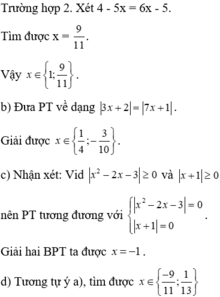giải phương trình:
2(x-3)+5x(x-1)=5x
(3x-1)(x2+2x)+(3x+1)=0
Giải phương trình :
1) √x2+x+2 + 1/x= 13-7x/2
2) x2 + 3x = √1-x + 1/4
3) ( x+3)√48-x2-8x= 28-x/ x+3
4) √-x2-2x +48= 28-x/x+3
5) 3x2 + 2(x-1)√2x2-3x +1= 5x + 2
6) 4x2 +(8x - 4)√x -1 = 3x+2√2x2 +5x-3
7) x3/ √16-x2 + x2 -16 = 0
Giải các phương trình sau:
g/ x(x + 3)(x – 3) – (x + 2)(x2 – 2x + 4) = 0
h/ (3x – 1)(x2 + 2) = (3x – 1)(7x – 10)
i/ (x + 2)(3 – 4x) = x2 + 4x + 4
k/ x(2x – 7) – 4x + 14 = 0
m/ x2 + 6x – 16 = 0
n/ 2x2 + 5x – 3 = 0
\(m,x^2+6x-16=0\)
\(\Leftrightarrow x^2-2x+8x-16=0\)
\(\Leftrightarrow x\left(x-2\right)+8\left(x-2\right)=0\)
\(\Leftrightarrow\left(x+8\right)\left(x-2\right)=0\)
\(\Leftrightarrow\left[{}\begin{matrix}x+8=0\\x-2=0\end{matrix}\right.\)
\(\Leftrightarrow\left[{}\begin{matrix}x=-8\\x=2\end{matrix}\right.\)
\(n,2x^2+5x-3=0\)
\(\Leftrightarrow2x^2-x+6x-3=0\)
\(\Leftrightarrow x\left(2x-1\right)+3\left(2x-1\right)=0\)
\(\Leftrightarrow\left(x+3\right)\left(2x-1\right)=0\)
\(\Leftrightarrow\left[{}\begin{matrix}x+3=0\\2x-1=0\end{matrix}\right.\)
\(\Leftrightarrow\left[{}\begin{matrix}x=-3\\x=\dfrac{1}{2}\end{matrix}\right.\)
\(k,x\left(2x-7\right)-4x+14=0\)
\(\Leftrightarrow2x^2-4x-7x+14=0\)
\(\Leftrightarrow2x\left(x-2\right)-7\left(x-2\right)=0\)
\(\Leftrightarrow\left(2x-7\right)\left(x-2\right)=0\)
\(\Leftrightarrow\left[{}\begin{matrix}2x-7=0\\x-2=0\end{matrix}\right.\)
\(\Leftrightarrow\left[{}\begin{matrix}x=\dfrac{7}{2}\\x=2\end{matrix}\right.\)
Giải các phương trình sau:
a) 4 − 5 x = 5 − 6 x ; b) 3 x + 2 − 7 x + 1 = 0 ;
c) x 2 − 2 x − 3 + x + 1 = 0 ; d) 1 4 x − 5 = 3 x + 1
a) Trường hợp 1. Xét 4 - 5x = 5 - 6x.
Tìm được x = 1.

Giải các phương trình sau:
i, (2x-1)2+(2-x)(2x-1)=0 j, (x-1)(5x+3)=(3x-5)(x-1) k, (4x+20)(x-6)=0 m, x3+x2+x+1=0 |
i,<=>(2x - 1)(2x - 1 + 2 - x) = 0 <=> (2x - 1)(x + 1) = 0
<=> x = 1/2 hoặc x = -1
j,<=>(x - 1)(5x + 3) - (3x - 5)(x - 1) = 0
<=>(x - 1)(2x + 8) = 0 <=> x = 1 hoặc x = -4
k,<=>4(x + 5)(x - 6) = 0 <=> (x + 5)(x - 6) = 0
<=> x = -5 hoặc x = 6
m,<=>x^2(x + 1) + x + 1 = 0
<=>(x^2 + 1)(x + 1) = 0 (1)
Mà x^2 + 1 > 0 với mọi x nên (1) xảy ra <=> x + 1 = 0
<=> x = -1
Giải các phương trình sau:
a) 2 x − 1 = 2 x − 5 ; b) 7 − x − 2 − 3 x = 0 ;
c) x − 4 + x 2 − 5 x + 4 = 0 ; d) x 2 − x − 2 x + 1 − x = 0 .
giải các Phương trình sau
a) (5x+3)(x2+1)(x-1)=0
b) (4x-1)(x-3)-(x-3)(5x+2)=0
c) (x+6)(3x-1)+x2-36 =0
a: =>(5x+3)(x-1)=0
=>x=1 hoặc x=-3/5
b: =>(x-3)(4x-1-5x-2)=0
=>(x-3)(-x-3)=0
=>x=-3 hoặc x=3
c: =>(x+6)(3x-1+x-6)=0
=>(x+6)(4x-7)=0
=>x=7/4 hoặc x=-6
Hãy giải các phương trình sau đây :
1, x2 - 4x + 4 = 0
2, 2x - y = 5
3, x + 5y = - 3
4, x2 - 2x - 8 = 0
5, 6x2 - 5x - 6 = 0
6,( x2 - 2x )2 - 6 (x2 - 2x ) + 5 = 0
7, x2 - 20x + 96 = 0
8, 2x - y = 3
9, 3x + 2y = 8
10, 2x2 + 5x - 3 = 0
11, 3x - 6 = 0
1) Ta có: \(x^2-4x+4=0\)
\(\Leftrightarrow\left(x-2\right)^2=0\)
\(\Leftrightarrow x-2=0\)
hay x=2
Vậy: S={2}
Giải các phương trình sau:
a) 2 x 3 x − 2 = 3 x − 1 3 x − 2 ;
b) 2 x − 5 x + 2 = x 2 − 5 x ;
c) x − 1 2 x + 1 + 2 x = 2 ;
d) x + 2 3 − 9 x + 2 = 0 .
`4x=2+xx+1x<=>4x=2+3x<=>4x-3x=2<=>1x=2<=>x=2`
bài 1 giải các bất phương trình sau
a, -x2 +5x-6 ≥ 0
b, x2-12x +36≤0
c, -2x2 +4x-2≤0
d, x2 -2|x-3| +3x ≥ 0
e, x-|x+3| -10 ≤0
bài 2 xét dấu các biểu thức sau
a,<-x2+x-1> <6x2 -5x+1>
b, x2-x-2/ -x2+3x+4
c, x2-5x +2
d, x-< x2-x+6 /-x2 +3x+4 >
Bài 1:
a: \(\Leftrightarrow x^2-5x+6< =0\)
=>(x-2)(x-3)<=0
=>2<=x<=3
b: \(\Leftrightarrow\left(x-6\right)^2< =0\)
=>x=6
c: \(\Leftrightarrow x^2-2x+1>=0\)
\(\Leftrightarrow\left(x-1\right)^2>=0\)
hay \(x\in R\)